Do the reasons for reducing meat consumption matter?
Hi Everyone,
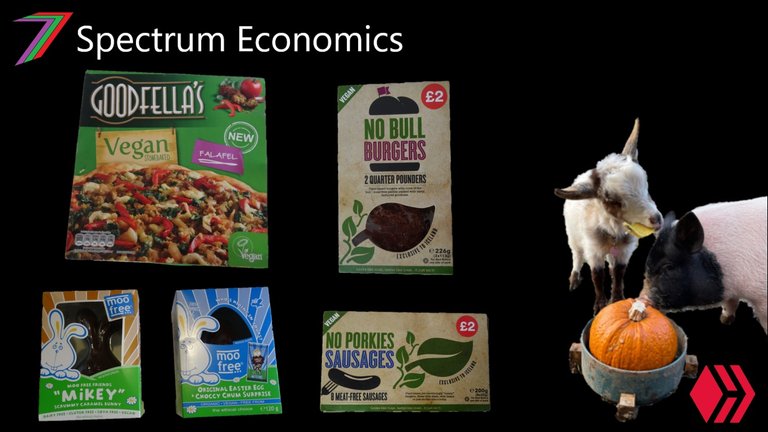
I switched to a plant-based diet in 2016. I believe doing so was one of the best decisions I have ever made in my lifetime. I describe my journey in two videos; see video 1 and video 2. I also do not buy or support products or activities that cause intentional harm to animals. For example, I would not buy products if they are tested on animals and I would not attend or watch events that exploit animals such as horseracing. I like to describe this as a desire for a cruelty-free lifestyle, which currently translates into doing minimal harm to others (both humans and animals) and our environment. Essentially, I have adopted a vegan lifestyle but I prefer the terminology ‘plant biased diet and cruelty-free lifestyle’. I explain my reasons in my post, ‘Title change: From ‘Vegan’ Economics to ‘Cruelty-free’ Economics’.
In this post, I want to explore people's reasons for reducing meat consumption. I consider reducing meat consumption to be good. My two main reasons are animal suffering and the broader environmental damage caused by rearing them. I would consider adopting a vegan lifestyle the best approach but vegetarianism and flexitarianism are still steps in the right direction as both still result in less meat being consumed.
Are we consuming less meat?
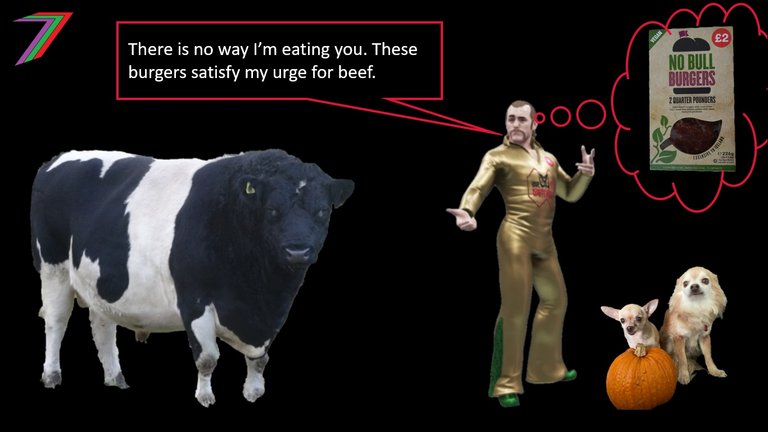
Before exploring the reasons for reduced meat consumption, we should investigate the extent of the desire as well as actual reduction in meat consumption. Google trends offers a good insight into what people are searching and exploring. Figure 1 contains the search trends for ‘plant-based diet’, Figure 2 contains the search trends for ‘veganism, and Figure 3 contains the search trends for ‘semi-vegetarianism’. The search duration is from 2004 to 2021 and searches are based on ‘topic’ rather than ‘term’, thus capturing a broader range of searches relating to the subject matter.
Figure 1: Google Trends Plant-based diet
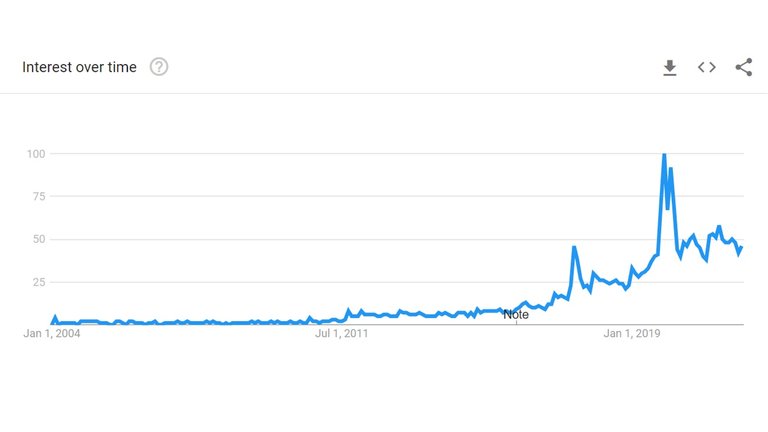
Source: Google Trends
Figure 2: Google Trends veganism
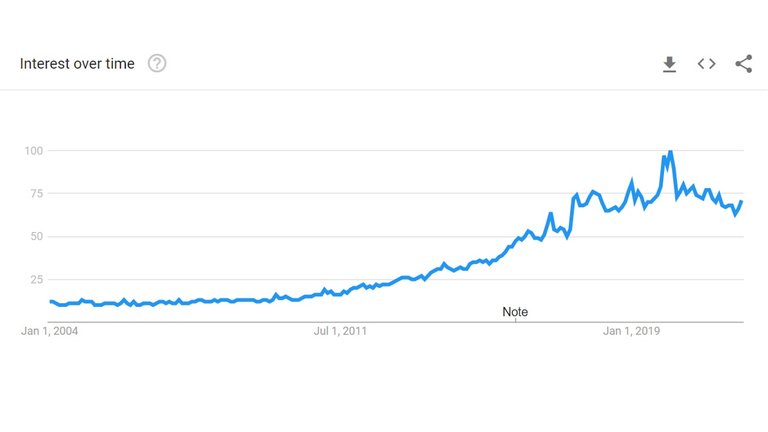
Source: Google Trends
Figure 3: Google Trends semi-vegetarianism
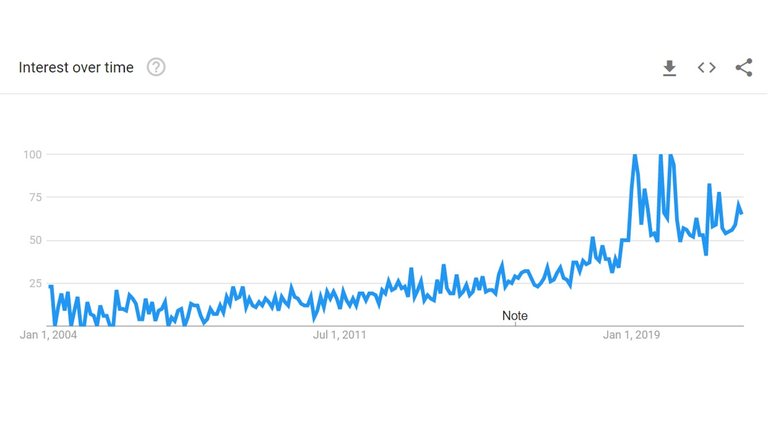
Source: Google Trends
The trends for all three searches indicate a growing interest in diets and lifestyles that involve a lower consumption of meat.
Culinary website Chef’s Pencil has provided a breakdown of countries with the most Google searches relating to veganism.
Figure 4: Popularity of veganism based on Google searches (2020)
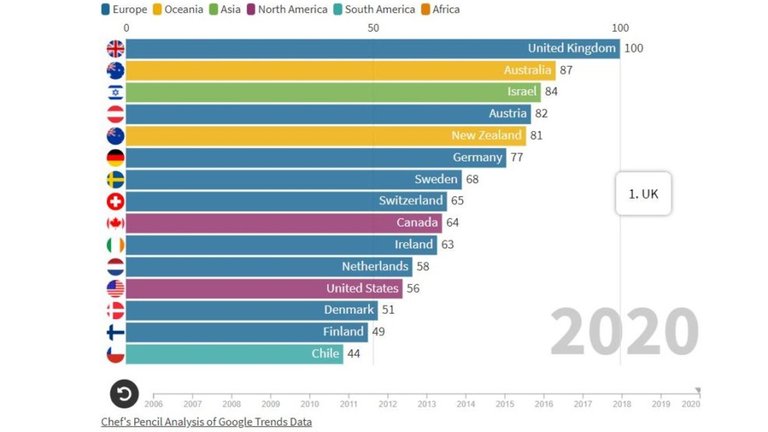
Source: Chef’s Pencil cited by The New Daily
Veganism appears to be most popular in Europe and Oceania with 7 of the top 8 countries.
If there is a desire for something, the market normally responds by offering more or higher quantities of that something. Is that the case for meat alternatives? Figure 5 contains the growth in sales in plant-based foods from 2017 to 2019.
Figure 5: Growth in plant-based foods
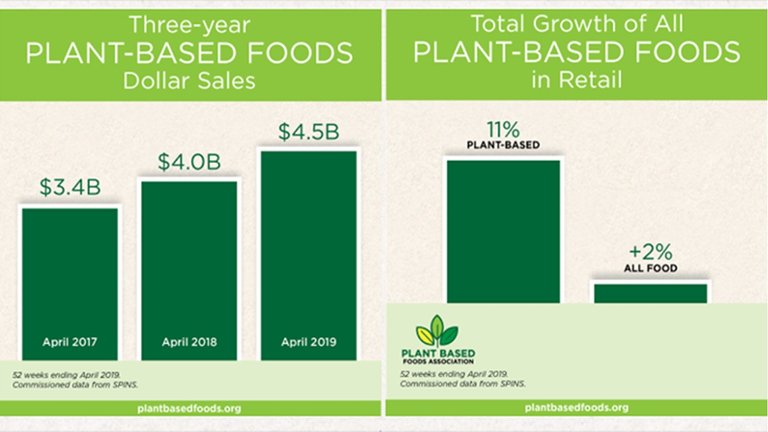
Source: Supermarket News
Growth in plant-based foods appears to be very strong and has outpaced the growth of all foods by about 5 times. If people are eating more plant-based foods at home, could they be eating more plant-based foods out as well? Figure 6 contains the growth in vegan and vegetarian restaurants between 2007 and 2019.
Figure 6: Growth in vegan and vegetarian restaurants in Europe
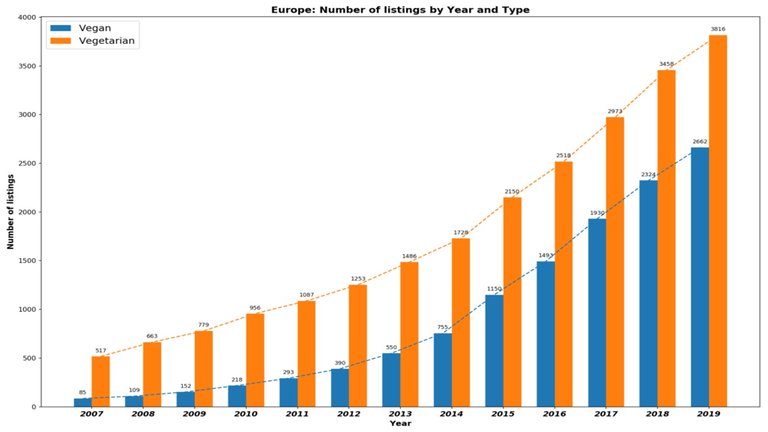
Source: Happy Cow
In Europe, in just over a decade, the number of vegan restaurants have increased by over 30 times and the number of vegetarian restaurants have increased by over 7 times. This is a strong indication that the demand for meat alternatives has increased and is expected to continue to increase.
Another area we can look at is people’s perceptions and attitudes towards the amount of meat they consume. According to a Gallup survey available on Statista, approximately 1/5 of Americans claim to have eaten less meat in the past year compared with previous years. See Figure 7 for the breakdown for men and women.
Figure 7: Americans are reducing meat consumption
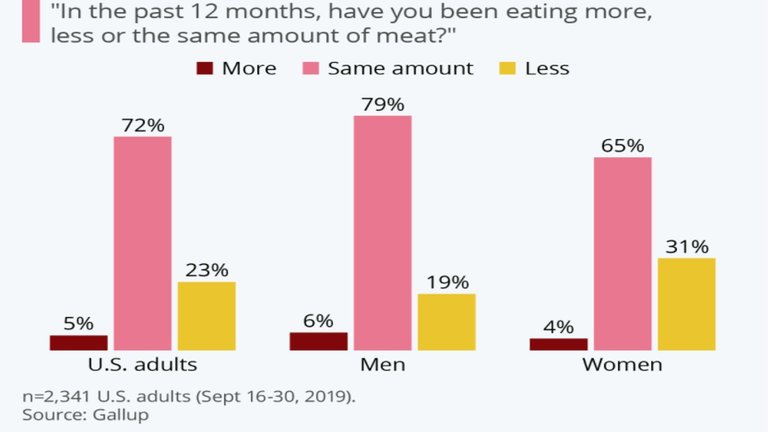
Source: Statista
There is ample evidence suggesting that people desire to consume less meat. Many people are eating plant-based foods (i.e. home and at restaurants), they are searching and researching plant-based diets online, and when surveyed claim to be eating less meat. How has global meat consumption been affected by people’s desire to eat less meat? Figure 8 contains global meat consumption between 1990 and 2020.
Figure 8: Global meat consumption (1990 to 2020)
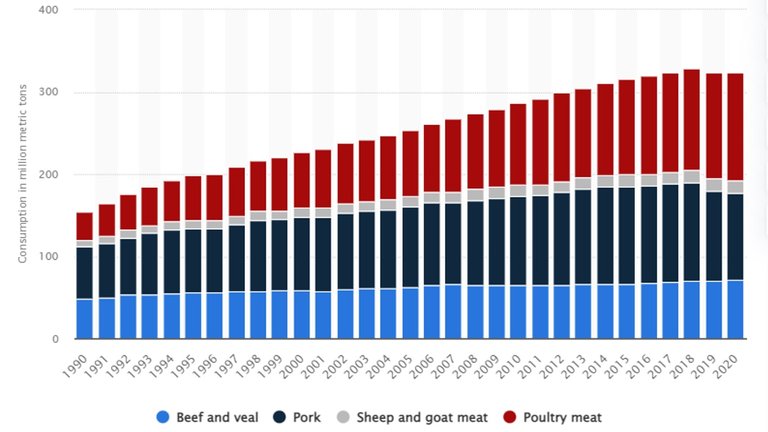
Source: Statista
Meat consumption has continued to increase but at a decreasing rate. In 2019, meat consumption declined slightly. It appears people’s desire to eat less meat has not had a large impact on global meat consumption. The data indicating a desire to reduce meat has come mostly from western sources (e.g. survey of American food consumption and data of growth in European restaurants). The global population of people continues to increase, which would also account for a growth in meat consumption. Figure 9 contains the per capita consumption of red meat in the USA between 2010 and 2021.
Figure 9: Per capita red meat consumption USA (2010 to 2021)
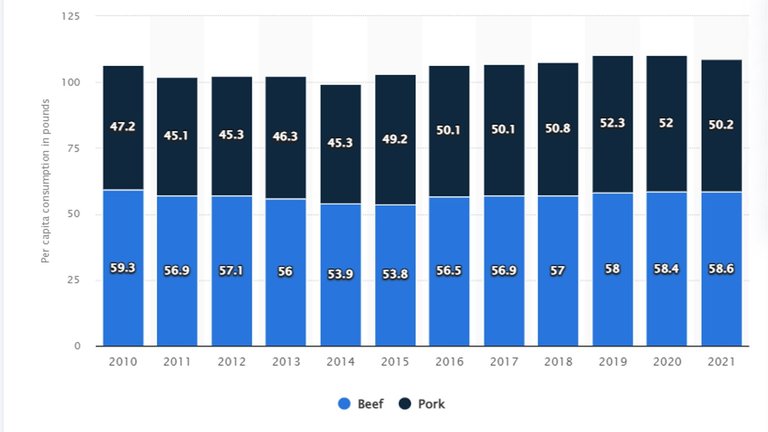
Source: Statista
On average, it appears that people are consistently eating about the same amount of red meat over the past decade. Red meat consumption increased in 2019, while it decreased globally. Figure 10 contains per capita consumption of poultry, pork, and beef in the USA between 1970 and 2018.
Figure 10: Per capita poultry, pork, and beef consumption USA (1970 to 2018)
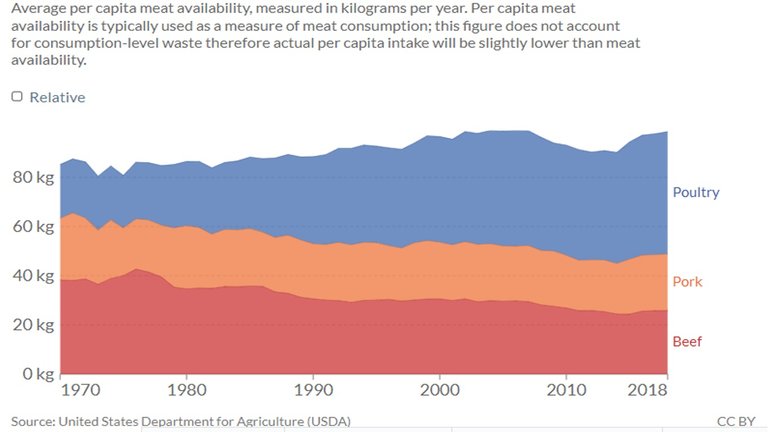
Source: Our World in Data
Meat consumption per capita appeared to fall from the mid-2000s to the early 2010s but after that, it began to increase again. This is mostly because of the increase in consumption of poultry.
The USA does not appear to be reducing its meat consumption per person but that might be different in Europe. Figure 11 contains per capita consumption of poultry, pork, and beef for the European Union (including UK and existing 27 countries) between 1990 and 2018.
Figure 11: Per capita poultry, pork, and beef consumption EU (1990 to 2018)
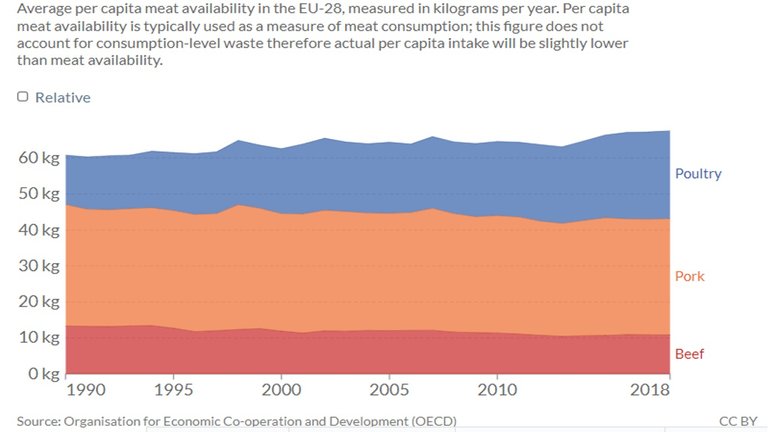
Source: Our World in Data
Overall meat consumption is higher despite consumption of pork and beef both falling slightly. It appears these meats are being substituted by poultry. It appears the growth in meat consumption in Europe has been smaller than the USA.
Which countries have the highest per capita meat consumption? Figure 12 contains the countries with the highest meat consumption per capita.
Figure 12: Countries with the highest per capita meat consumption in 2018
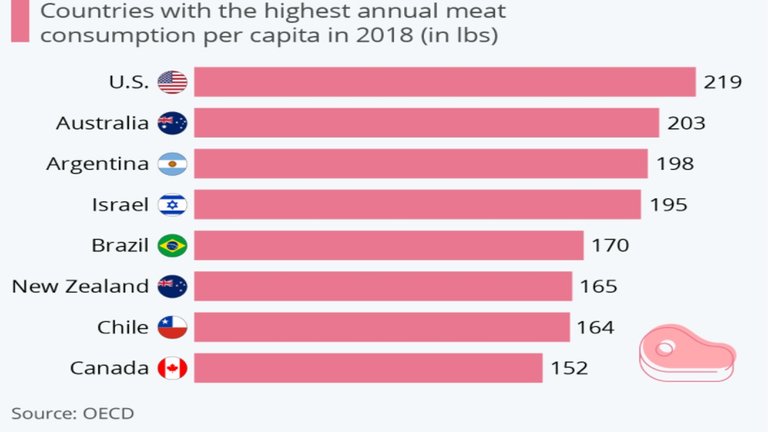
Source: Statista
USA and Australia top the list of countries with highest per capita meat consumption. Ironically, 3 of the top 8 countries (Australia, New Zealand, and Israel) with highest per capita meat consumption are showing the greatest interest in veganism. If this interest translates into action, global meat consumption per capita should begin to fall. Figure 13 contains Australia’s consumption of beef and veal from 2013 to 2020 as well as projections of meat consumption up until 2029.
Figure 13: in Australia per capita consumption of beef and veal from 2013 to 2020 with forecast to 2029
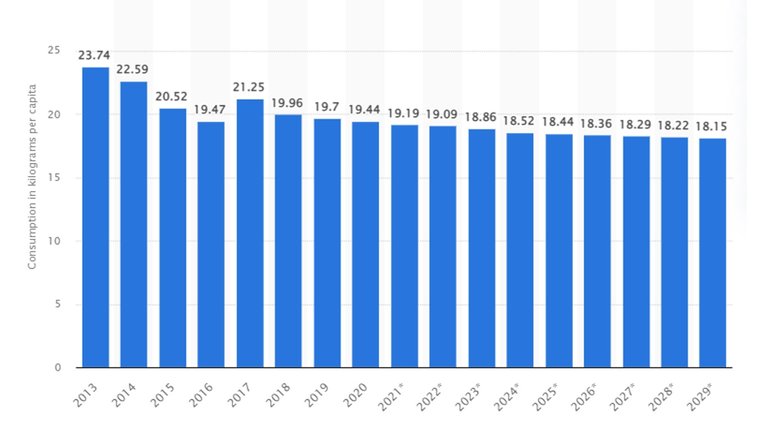
Source: Statista
It appears the interest in veganism and plant-based alternatives might be resulting in a reduction in the consumption of red meat.
Figure 14 contains a more detailed breakdown of the types of meat consumed by different countries.
Figure 14: Countries with the highest per capita meat consumption in 2017 plus breakdown
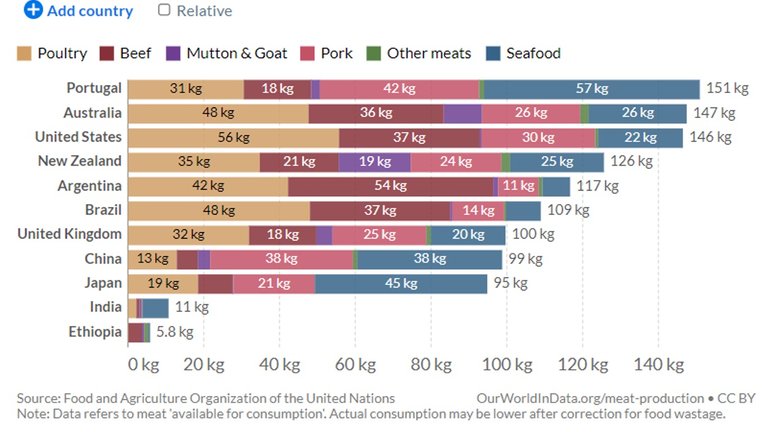
Source: Our World in Data
This data is from a year earlier but is useful as provides a detailed breakdown of the types of meat consumed in different countries. If seafood is included, in 2017, Portugal consumed more meat per capita than any other country. Figure 14 also shows the sharp contrast in meat consumption of countries such as India with the countries with the highest levels of meat consumption.
Is there a contradiction in the data?
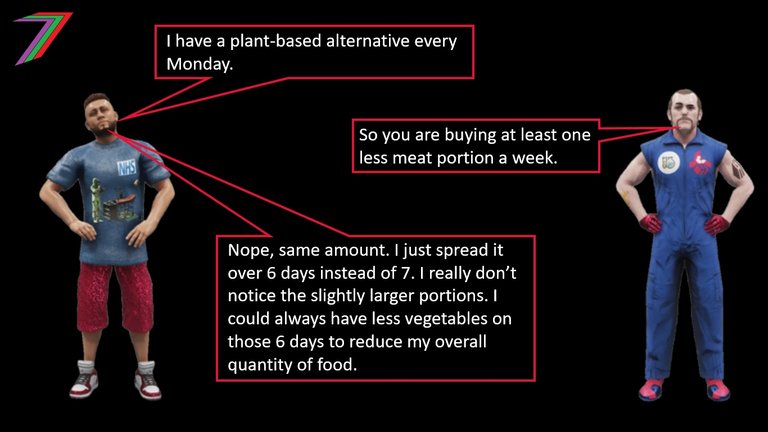
People have demonstrated an interest in veganism, plant-based foods, and reducing their consumption of meat. Consumption of plant-based alternatives is rising rapidly. However, the consumption of meat even per capita is barely falling and for some countries, it is still increasing. This might appear to be a contradiction if we assume most people are:
- following up on their interest in reducing meat consumption
- substituting meat products with meat alternatives rather than just eating more food
- the people who are not switching to plant-based food are not eating more meat, which compensates for the people that are eating less meat
It is also possible that the transition away from meat is temporary. That brings us back to the title of this post ‘Do the reasons for reducing meat consumption matter?’.
To understand the reasons for reducing meat consumption (in many cases the intention to reduce meat consumption) we should consider the type of diets and the popularity of these diets. Figure 15 contains the diets of Americans based on the extent of their meat and dairy consumption.
Figure 15: Diets of potential plant-based customers
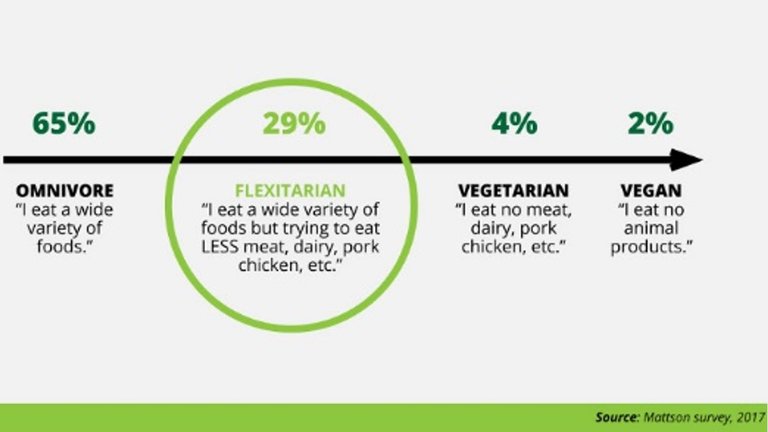
Source: Plant Based Foods Association
The largest group of people aiming to reduce their meat consumption are flexitarians. This group aims to reduce the amount of meat in their diet instead of not consuming at all. The vegetarians and vegans make up a much smaller percentage of the population. Therefore, will have a smaller impact on overall reduction of meat consumption.
Even though, vegans make up a small percentage of people with reduced meat consumption, it is worth considering their reasons for adopting such a lifestyle. Figure 16 contains a global survey of the main reason people became vegan.
Figure 16: Main reason for becoming vegan
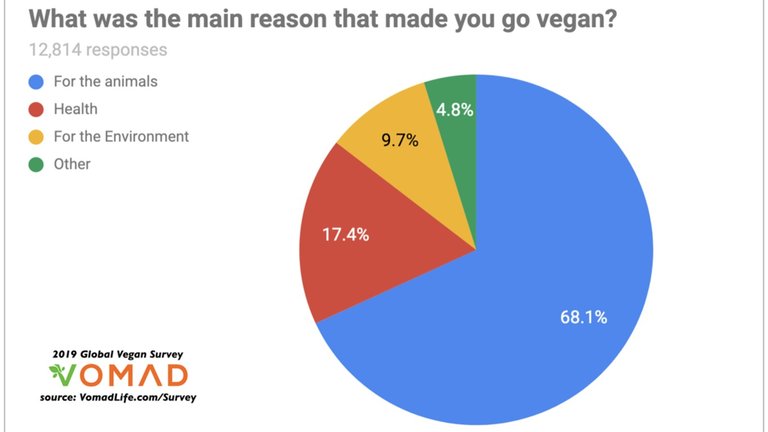
Source: Vomad
Animal welfare (68.1%) was the clear number one reason people become vegan worldwide. Health (17.4%) was second, and environment (9.7%) was third. Figure 17 contains another survey for becoming vegan; this one is just for the UK
Figure 17: Main reason for becoming vegan (UK only)
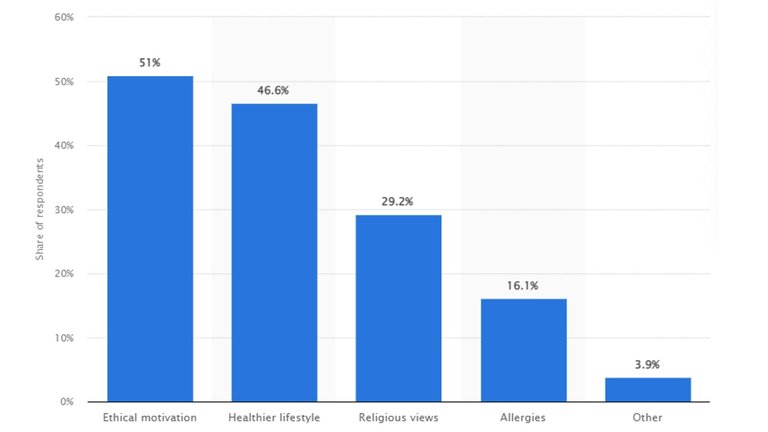
Source: Statista
Ethical reason topped the list at 51% but healthier lifestyle followed closely at 46.6%. Religious views (29.2%) and allergies (16.1%) were third and fourth respectively.
People who value animal welfare/ethical reasons, religious views, and have allergies should be expected to remain vegan, as these reasons should not be expected to change over time. However, health reasons are more likely to change, as new diets are constantly coming available and many of them are likely to be easier to follow than veganism.
The EPIC-Oxford Study indicates a very high proportion of vegans and vegetarians remain so in the long-run. According to their study of respondents from the 1990s, 73% were still vegan or vegetarian in 2010 (Plant Based News). However, another study conducted in 2014, indicated a high percentage (84%) of vegans and vegetarians abandon this diet. This study indicated that the majority of those who quit were only motivated to be vegan or vegetarian for health reasons (Faunalytics).
Do the motivations to reduce meat consumption amongst a broader group of people align with those given by vegans? Figure 18 contains reasons Americans have given for reducing meat consumption.
Figure 18: Reasons Americans have given for reducing meat consumption
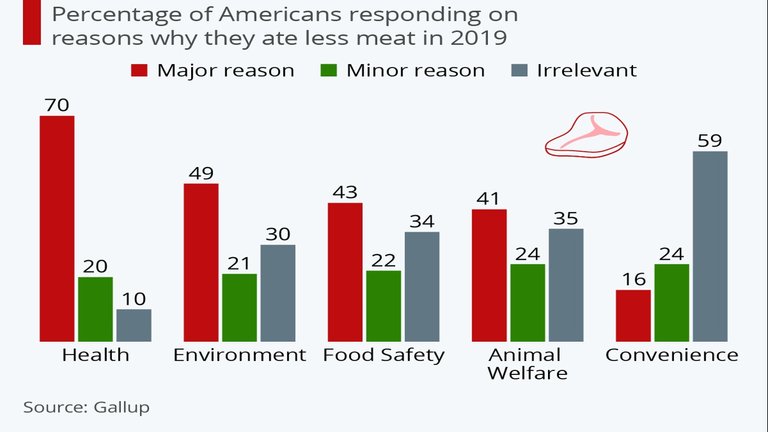
Source: Statista
Reasons for cutting back on meat appear to be dominated by ‘health reasons’ with 70% of respondents claiming it to be the main reason. Whereas, animal welfare is fourth with just 41% of respondents claiming it to be the main reason. Figure 19 contains another survey for the USA.
Figure 19: Reasons Americans have given for reducing meat consumption
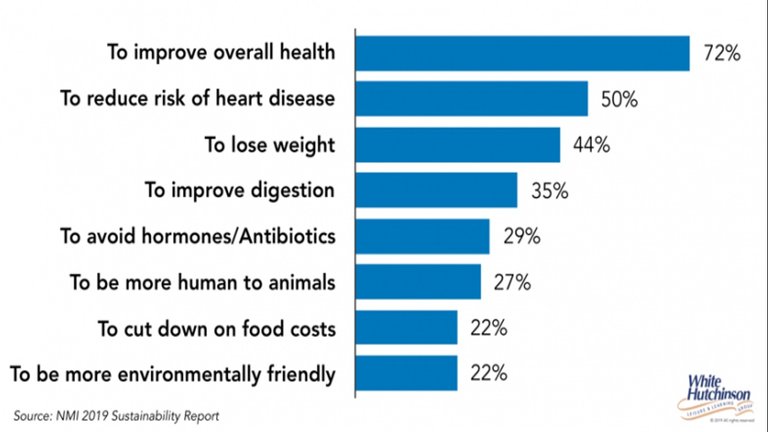
Source: White Hutchinson
Note: This survey allowed for multiple responses.
The results of this survey were dominated by health reasons. The top five reasons were related to health. Animal welfare was sixth with only 27%. Figure 20 contains reasons why people in the USA buy plant-based foods.
Figure 20: Reason for purchasing plant-based foods in the USA
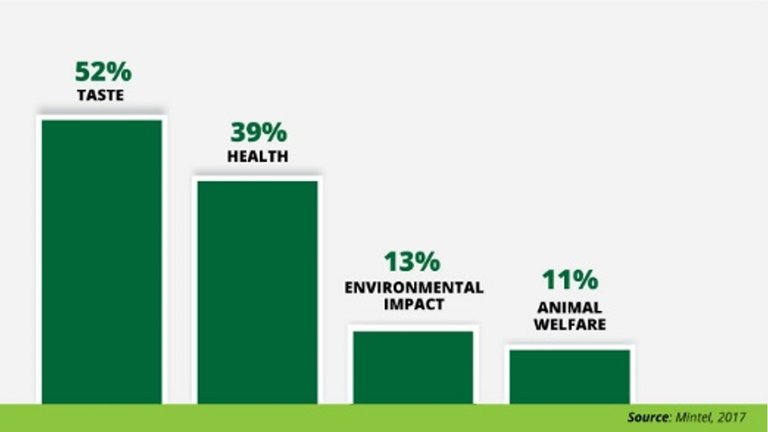
Source: Plant Based Foods Association
For this survey, the number one reason given for buying plant-based foods was taste (52%). This was followed by health (39%). Third was environment (13%). Fourth was animal welfare (11%). People’s tastes change frequently, it is unlikely to be a long-term reason for consuming less meat.
Are reasons for consuming less meat different in other countries? Figure 21 contains the reasons UK residents have given for reducing meat consumption.
Figure 21: Reasons UK residents have given for reducing meat consumption
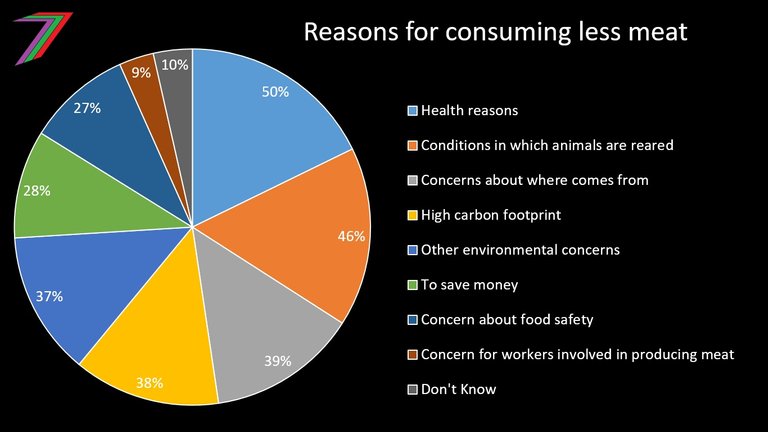
Source: Eating Better
Note: this survey allowed respondents to state numerous reasons and they were not required to rank them.
For the UK, health reasons were cited as the most likely reason for reducing meat consumption (50%). However, animal welfare was a close second (46%). This survey segregated carbon footprint (38%) from other environmental concerns (37%). I would assume a large overlap between carbon footprint and other environmental concerns. However, it is strange that carbon footprint has a slightly higher percentage considering all of the other environmental problems caused by rearing animals. I will revisit carbon footprint and climate change in the final section of this post.
The majority of people aiming to reduce meat consumption fall into the flexitarian diet category (see Figure 15). Therefore, we should assume that many people would consume both plant-based and meat products. Figure 22 contains the percentage of people who consume both plant-based meats and animal meats and the percentage of people who consume both plant-based milk and cow’s milk.
Figure 22: Consumers of both plant-based and animal products
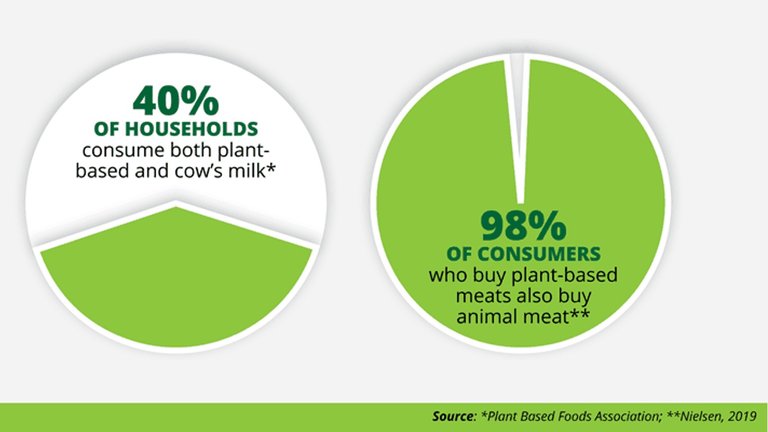
Source: Plant Based Foods Association
These figures strongly indicate that demand for plant-based meats is from flexitarians. Whereas demand for plant-based milks is more likely to be from vegetarians and vegans. This is quite concerning as plant-based meats might be considered a fad, which people might move away from when they become bored with it or when other options become available. The high percentage of people eating both animal and plant-based meat could be the reason per capita meat consumption is not falling in many countries. It is possible that plant-based meat will be eaten in addition to animal meat rather than instead of animal meat.
It is worth considering the age demographic of plant-based customers. Figure 23 contains the preferences for plant-based food for different generations of people.
Figure 23: Plant-based preferences according to generation
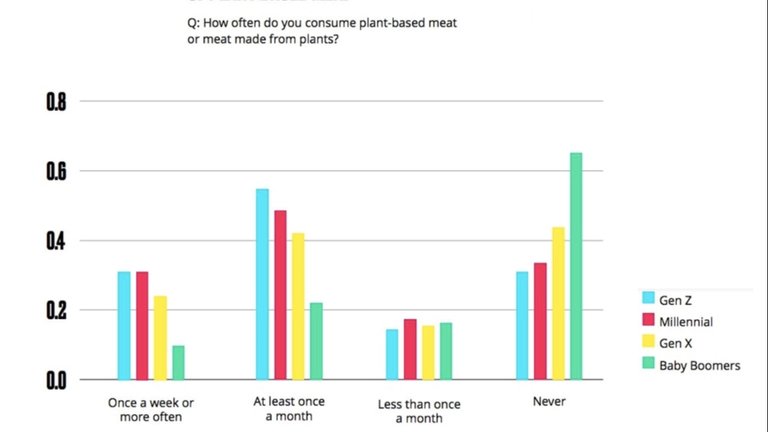
Source: Impossible Foods
Gen Z and millennials form the largest percentage of plant-based customers. There are as many Gen Z people eating plant-based meats once a week as there are that do not eat them at all (approximately 30%). This has both positive and negative implications. It is good that young people are interested in eating alternatives to animal meat but it is also concerning that these young people would also make-up a large percentage of people who eat both plant-based and animal meats. Therefore, may not have the commitment to stay with this diet or lifestyle in the long-run.
Possible rise of cultured meat
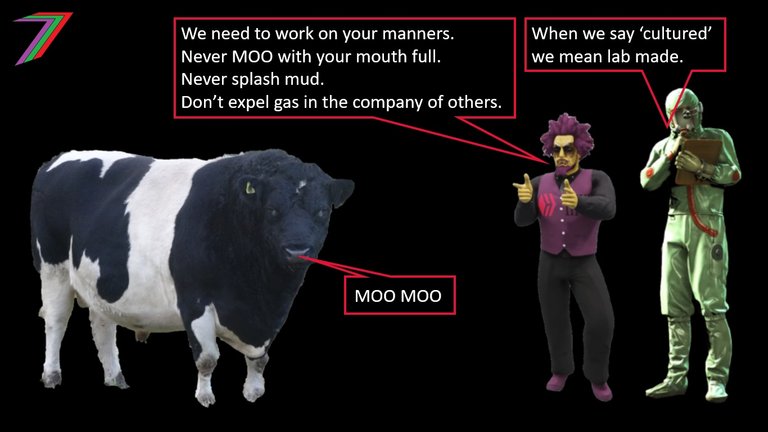
What is cultured meat? Below is a definition for cultured beef.
Cultured Beef is created by painlessly harvesting muscle cells from a living cow. Scientists then feed and nurture the cells so they multiply to create muscle tissue, which is the main component of the meat we eat. It is biologically exactly the same as the meat tissue that comes from a cow (Maastricht University).
Cultured meat will be treated as an alternative to both animal and plant-based meats. According to management consultant Kearney, cultured meat will lead to a significant decrease in consumption of traditional animal meats. Figure 24 contains their projections for global meat sales (i.e. includes animal, cultured, and plant-based meats).
Figure 24: Projected global sales of meat between 2025 and 2040
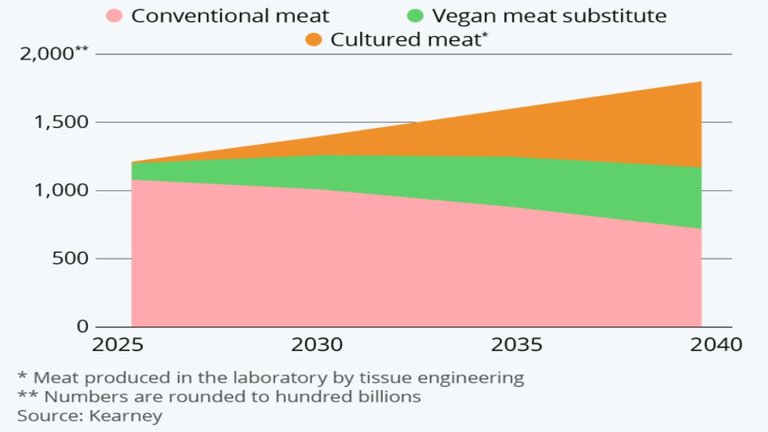
Source: Statista
The stated argument behind the transition to cultured meats is reduction in carbon dioxide emissions. However, this reason is mostly not consistent with most people’s current reasons for reducing meat consumption.
My views
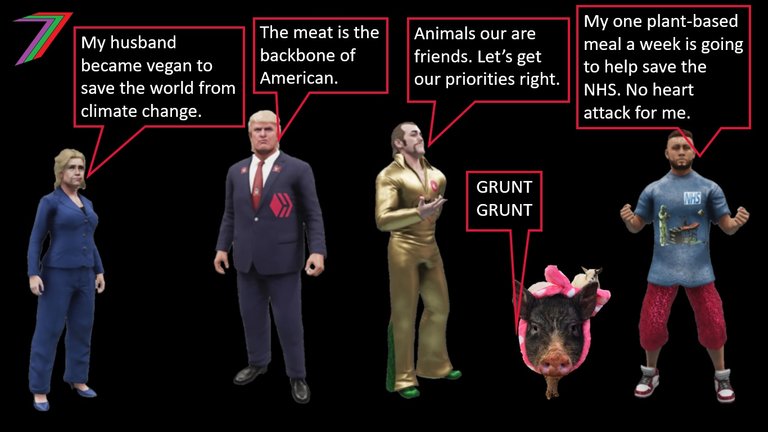
The increased consumption and desire to consume plant-based food is a positive sign. However, meat consumption has not fallen per capita in many of the countries where more people are consuming plant-based food. This could occur because people are eating more food per person, people could be eating fewer unprocessed vegetables (see Figure 25), or the people that are not trying to consume less meat are consuming more.
Figure 25: Per capita fruit and vegetable consumption in the USA
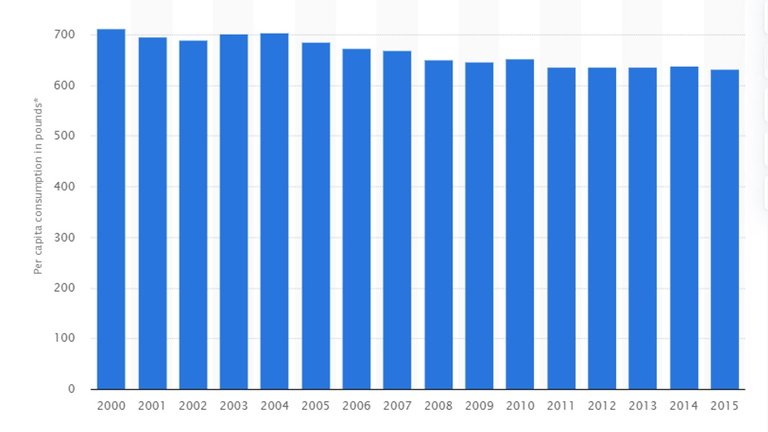
Source: Statista
Political ideology may also play a role in attitudes towards meat consumption. According to a 2018 Gallup Survey, Liberals are 5.5 times more likely to be vegetarian and 2.5 are more likely to be vegan than Conservatives. See Figure 26 below.
Figure 26: Vegetarian or vegan based on political belief (USA)
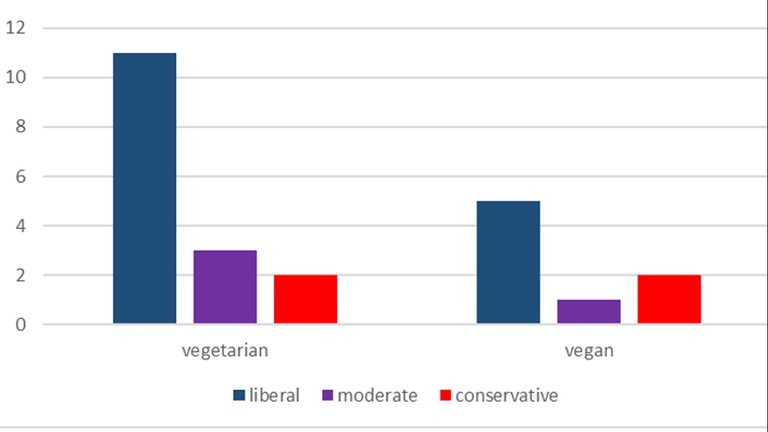
Source: Gallup cited by Psychology Today
The political divide in the US is currently very strong. ‘Liberal’ politicians are showing support for reduced meat consumption whereas ‘Conservative’ politicians more openly support the meat industries (Forbes). There is also the issue of climate change. Much of the media and political push for reduced meat consumption is focused around reducing our carbon footprint and climate change. The climate change agenda has grown considerably more political in recent years. This is mostly because Governments have been using climate change to gain greater political control, which is strongly opposed by some groups. Some of the people could be eating more meat as a political statement against left leaning Governments. Based on most of the surveys in this post, climate change is not one of the top reasons people eat less meat. Politicians and media are attempting to create the illusion that climate change is a much higher priority for those choosing to eat less meat.
I would like to see the consumption of meat fall worldwide. However, I want to see it fall for reasons that will motivate people to make a lifestyle change rather than just as a diet that could easily revert back into another diet, which has a high meat content. The low meat or non-meat lifestyles need to be balanced and healthy. For example, meat can be replaced with more vegetables or fruit rather than just plant-based meat alternatives, which are often less nourishing and contain preservatives and sometimes chemicals. I am also concerned about cultured meat. These meats will be made in laboratories and could contain many different substances and chemicals that may not be fully disclosed by the manufacturers. I also fear that just a few companies will dominate the cultured meat market. This is likely to lead to inferior products and higher free market prices. I would expect Government to subsidize these companies to lower the price so that people are more inclined to switch to the cultivated meats.
More posts

If you want to read any of my other posts, you can click on the links below. These links will lead you to posts containing my collection of works. These 'Collection of Works' posts have been updated to contain links to the Hive versions of my posts.
My CBA Udemy Course
The course contains over 10 hours of video, over 60 downloadable resources, over 40 multiple-choice questions, 2 sample case studies, 1 practice CBA, life time access and a certificate on completion. The course is priced at the Tier 1 price of £20. I believe it is frequently available at half-price.
Future of Social Media






The consumption of these animals can't be easy reduced due to the fact that it is already a daily routine being consumed and for preparing meal since it's what most people are been used too.
For many people habits and routines can be difficult to break. That's where the plant-based foods should help as they maintain the structure of the meal by offering a meat substitute.
Really interesting charts !!
I can see here that my country "France" is not shown :')
I had one week of holidays on Germany few months ago and that's impressive how much you can have a vegan meal in each restaurent, in France that's almost impossible until this is a vegan restaurent !
As a vegan People are often saying that vegans are buying industrial food with their fake meats. And I know that I buy some of it but. Maybe less than once per week. Probably only once per month, the rest of the time I eat vegetable proteins, cook my own tofu and seitan to be sure of what's inside and make it cheaper. And and know that my vegan friends are making the same, or at least not buying a lot of vegan meats.
That's really interesting to see that 98% of that problem which is buying too much industrial food to replace actual meats is made by omnivore or flexitarians. I already knew that they were the people buying most of it but didn't know it was that much :')
Really great post though !! !LUV and !PIZZA
@ykretz(1/1) gave you LUV. | wallet | market | tools | connect | <><
The 98% figure is really high. I was expecting a much lower figure. I'm not surprised that long-term vegans don't or rarely buy plant-based meats because they never needed anything like that before. However, there are plenty of new vegans and vegetarians who I expected to be buying these meats. It also appears that many who are reducing meat for health reasons are choosing plant-based meats over unprocessed vegetables and fruits.
Excellent post! I've been vegetarian since I was 10, now mostly vegan though I do eat eggs and occasionally fish. When people ask why, I mention animal rights, the planet, etc., but honestly the real reason is super hard to explain. For me, it's more spiritual. Not that I necessary think it's spiritually "bad" to eat meat, but when I do, I feel spiritually "off." Once I was served a soup with some sort of beef broth; I tried to eat it to be polite but I could taste the blood and just couldn't do it.
I totally understand it :') I don't really feel right when I think I ate meat :') !PIZZA
Yeah, it's weird, right? Some people say that if you eat meat after not eating it for a long time, you'll get sick, but I don't believe it's a physical thing like that. I've seen former vegetarians eat meat and they were just fine. For me, it's more subtle and more emotional than physical.
Yes I think too. I'm not sure that will make anything if I eat meat but I don't wanna try it 😅
PIZZA Holders sent $PIZZA tips in this post's comments:
ykretz tipped spectrumecons (x1)
@ykretz(1/6) tipped @katiecat1111 (x1)
Join us in Discord!
I try to be as close to raw vegan as is possible x
This is a very detailed read. It took about 15 minutes to finish it up.
I feel even in Africa, most of the reasons why people are reducing their meat intake is due to health reasons.
Ethical reasons will be the least if a study is being conducted.
Infact, number of meats in a fold is a cultural thing.
The father eats more meat than the rest of the family.
Most festivals use meat as their food for celebration.
A lot of people in Africa don't eat pork because of their religion.
Then seventh day Adventist members are vegetarians.
Stumbling across this older post of yours @spectrumecons, brought a satisfied smile to my face. It was not only well written and presented in a relatively, unbiased manner, the subject matter is one (related to health) of which I've had a long term interest in. Therefore an interesting and enjoyable read.
Personally, I've fluctuated between being a lacto-ovo vegetarian and flexitarian (yet very little meat as a flex) for over forty years. The reasoning behind such dietary manueverings have varied from time-to-time... but, usually with health and fitness in mind.
At over 70 years of age now, this dietary habit, along with regular exercise and a few other lifestyle changes (non-fanatically) has had very satisfactory affects/effects. I've no chronic illnesses, still agile, fit, strong and seemingly the healthiest of all my siblings, friends and acquantances of similar age (half of which are already dead, prior to their 60th birthdays)
I just wanted to share these beneficial outcomes with you and your readers for inspirational purposes😎
It's great that you have kept with a low meat diet for such a long time and have had such great results.
This is an extraordinary post - thanks for rebloggin @angryman - will revisit at some time, but sorry I missed it first time around. Please accept a tip.
Having been vegetarian and vegan, and opting for ethical meat maybe once a month when I can't resist because my body is telling me I need it, this post appeals to me. I'm interested in socio-cultural reasons we opt into a meat diet and it's interesting too how self interest (health) can take precedence over ahimsa (cause no harm).
It's also fascinating how many plant based PRODUCTS are out there and are completely unnecessary and probably worse for you health wise than meat. I get it - we live in a fast paced world where convenience trumps home cooked meals, and many have forgotten how easy it is is to 'whip up' a bean burger like my Mum always did, and I can do easily. It seems they are cashing in on a market. IN many ways it's marketing and consumerism I resist with my largely plant based lifestyle suppplemented with home grown food from my own garden (another act of resistance).
I'm also fascinated by meat eaters turned vegan after watching shows like Cowspiracy etc.
What I do resent is the attack on vegans for their lifestyle choices. Sure, they might mention it a bit - but out of necessity - as in, don't feed me that animal product because I intensely care about what I put in my body, the environment, and animals, so....
This is interesting as well. Before climate change was an argument, I guess liberals were more likely to be pro animal rights etc, more likely to be socialist. I think environmental reasons are a good reason to not choose meat - agricultural is responsible for environmental degradation, even if you put the whole climate change debate to one side. They say we only have 60 years of topsoil left through intenstive farming practices, including livestock. Bananas. Also, the amount of WASTE - we don't eat what we need, but what we are told we need. Chicken wings, not the whole chicken. If I eat chicken, I choose it whole, and use every part of it, even down to bones for stock. WE seem to have lost that close connection to food, which disconnects us from our very selves, the environment, the entire world. Everythign becomes mindless consumption. PErhaps it's the mindlessness that bothers me, and reminds me the careful attention of this post on such matters is what appeals to me. Thansk for sharing.
It's nice to see my re-posting of this article reached you @riverflows and that you found as much value in reading it as I did. Thank you for including me within your comment.
Like you, I too made the decision to go meat free years ago. The first time, I lasted only two months before I cracked and [Cheated?]... That was before any consideration of what the life of an animal, raised for slaughter might be like, along with the ultimate inhumane, killing process.
When that aspect entered the picture, I lost all desire for meat, which lasted two years the second time around.
Since... I hardly ever eat meat (like you) rarely missing it, yet will when my body seems to be calling for it as well. I select only what's labeled as humanely raised, free range and grass fed in those rare moments - which lessens my feelings of guilt.
I probably shouldn't tell you this - being the 'AngryMan' with a reputation to uphold, but while preparing and consuming meat, I kind of thank the spirit of the animal/s through prayer/meditation along with saying I'm sorry for any suffering and pain it might have endured.
I've heard that some American Indians used to practice thankfulness to the land and animals in similar fashion...
Nice to hear from you.
Our connection with food is definitively broken. We have giant supermarkets with aisles full of canned, packaged, and frozen foods. None of these products physically even closely resemble their contents. Convenience has a lot to do with it. Quick and easy to cook and can sit on a shelf or in a freezer for months. Eventually, this type of shopping becomes a habit, which gets passed along to the future generations.
Grateful for my Mum who taught me how, and proud I passed it to my son. Hoping many are waking up to it though. Eternally optimistic.